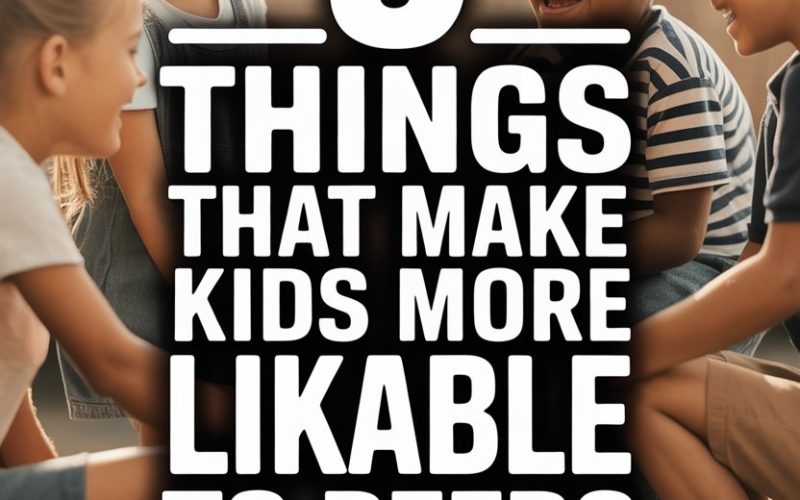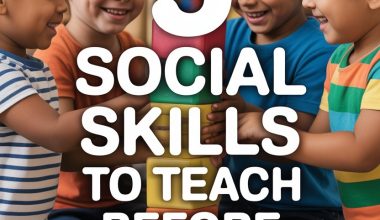Every parent wants their child to have a friend or two to giggle with at recess, someone to swap snacks with, maybe even a future best mate who’ll still remember their favorite ice cream when they’re 40.
While you can’t (and shouldn’t) force friendships, you absolutely can help your kid become the kind of mate others are excited to see at the playground.
Likability isn’t about being the loudest in the room or always letting others win at Uno. There’s a science—and a little art—to it.
Let’s get right to the five things that make kids more magnetic to their peers.
1. Kids Who Listen (Really Listen) Attract Friends Like Bees to Jam
Turns out, being a good listener is pure magic on the playground.
When your child tunes in, makes eye contact, and responds thoughtfully—even if the conversation revolves around Minecraft or what so-and-so had for lunch—they’re sending a powerful message: “You matter.”
Active listening isn’t just a grown-up skill. Researchers at the University of Nebraska found that children who show genuine interest in others’ thoughts and feelings stand out as more likable in group settings.
Listening is the social version of sharing your last biscuit.
You can boost this superpower at home. Next time your child shares a story, ask follow-up questions. Model attentive listening by putting your phone down (yes, even during the 47th retelling of the same Pokémon battle).
Compliment your child when you spot them practicing this skill with siblings or friends: “I noticed you really listened when Jamie was upset. That was kind.”
Listening isn’t just polite—it’s irresistible.
2. Sharing and Taking Turns: The Unofficial Kid Social Currency
If there’s one thing that can turn a game of tag into a full-blown friendship, it’s generosity.
Sharing, whether it’s a toy, a snack, or a turn at the front of the line, is the grease that keeps the wheels of childhood social life spinning smoothly.
It doesn’t have to be monumental. In fact, small acts—offering a crayon, letting a friend go first, including someone new in a game—carry enormous weight.
A study in the journal Child Development found that kids who share and take turns are seen not only as friendlier but as “leaders” among their peers.
You can encourage sharing at home with some good old-fashioned role play. Set up a “tea party” with imaginary biscuits (or real ones, if you’re feeling brave), and practice taking turns pouring tea.
Praise those moments of generosity, even if the ‘sharing’ was reluctant at best.
Remember, a child who shares is a child who’s sought after.
3. Kindness Is Contagious (And Your Child Can Start the Outbreak)
No surprise here—kind kids are simply more likable. When a child offers a comforting word, stands up for a classmate, or gives out compliments like confetti, other kids notice.
Don’t just take my word for it. A study out of the University of British Columbia showed that children who performed three small acts of kindness each week experienced not only a boost in popularity but also increased feelings of happiness and acceptance.
The best part? These acts were as simple as helping someone with a tricky zipper or inviting a classmate to join a game.
Kindness grows with practice. Start a family tradition: each evening, share one nice thing everyone did for someone else. Keep it light and fun—think of it as your daily “warm and fuzzy” roundup.
Model kindness yourself (even if it’s just not muttering about the driver who cut you off). Kids have a radar for hypocrisy, after all.
4. Handling Disagreements Without Turning into Godzilla
Every friendship hits the odd speed bump—a toy snatched away, someone refusing to play by the rules, or that all-important debate over whether ketchup belongs on everything.
How your child handles these mini-conflicts can make or break their likability.
The magic lies in being able to state a need or feeling without blowing up or shutting down.
According to child psychologist Dr. Laura Markham, kids who can express frustration, negotiate, and even sometimes compromise are far more likely to be described by peers as “easy to get along with.”
Try the “I feel… when… because…” sentence starter at home. For example: “I feel upset when you won’t let me have a go because I’ve been waiting.”
Silly as it sounds, practicing this during a family board game meltdown does wonders. It won’t turn your six-year-old into a Zen master overnight, but it does set the stage for smoother interactions with friends.
And yes, sometimes you’ll need to step in and coach, especially when the disagreement involves a toy, a snack, or the last slice of pizza—otherwise known as the “Holy Grail of Sibling Arguments.”
5. A Good Sense of Humour: The Social Superglue
Ever noticed how the kid who can laugh at themselves, tell a goofy joke, or make the grumpiest child giggle tends to attract friends like seagulls to chips?
A sense of humour acts as social superglue, helping children connect, diffuse tension, and bounce back from awkward moments.
Researchers at Stanford point out that humour signals confidence, approachability, and resilience. It doesn’t matter if your child’s knock-knock jokes could use some work—what matters is being able to laugh, especially at their own silly mistakes.
Humour builds bridges where words sometimes falter.
Encourage this at home by laughing together—yes, even if you’re the punchline. Watch a funny film, make up silly songs, or host a “worst joke” competition at the dinner table.
The goal isn’t comedic genius; it’s helping your child see that laughter connects, calms, and creates memories.
And if your child is shy or slow to warm up? Celebrate their unique brand of humour, even if it’s more deadpan than stand-up.
Making Likability Stick: It Starts At Home
There’s no secret handshake for making friends, but these habits put your child at the front of the queue.
The best part? These skills can be taught, modeled, and encouraged in tiny, ordinary moments around the house, long before the school gate looms.
Think of it as giving your kid a friendship toolbox—one that works just as well at age five as it does at twenty-five.
A child who listens, shares, shows kindness, manages disagreements, and invites laughter will find their people, often when you least expect it.
And yes, even if your child is a little quirky, shy, or more interested in cloud shapes than football scores, these skills help them shine in their own way. Every child deserves to feel included, valued, and genuinely liked—for exactly who they are.
Now, who’s up for a round of the world’s worst knock-knock jokes at dinner tonight? Your child (and their future friends) will thank you for it.




